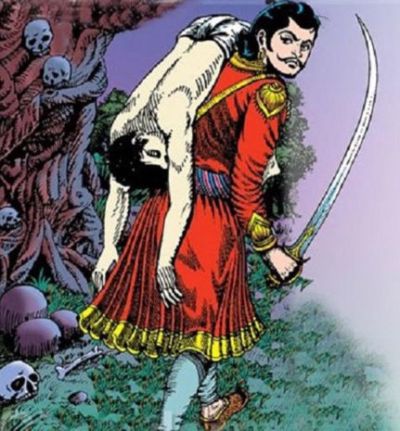“But Maṇivarman? When he saw. his wife lying dead in another man’s arms, from the intense longing that she had for that man, it called for indignation, but far from being angry, he was overcome by grief that stemmed from his infatuation for his wife.”
“This, in spite of her not liking him and making it clear to him that she did not love him.”
“And so it was Maṇivarman who was the most infatuated of the three…”
As the king uttered these words, the Vetāla flew off his shoulder, laughing. And King Vikram once more started to walk towards the banyan tree, determined to fetch him.

द्वा विम्शो वतेालः
The twenty-second story
The four brothers and a lion
ततो राजा पुनर् गत्वा वेतालं शिंशपाग्रतः ।
स त्रिविक्रमसेनस् तं प्राप्यांसारोपितं व्यधात् ॥ १२,२९.१ ॥
आयान्तं तं च राजानं स वेतालो ऽब्रवीत् पथि ।
राजन् साधुः सुसत्त्वस् त्वं तद् अपूर्वां कथां शृणु ॥ १२,२९.२ ॥
King Vikram went back to the tree, and bringing down the Vetāla, placed him across his shoulders and started to walk back.
As the king walked in silence, the Vetāla spoke from his shoulder.
“Oh king! You are good, and brave, and have a steady mind…so let me entertain you with a strange tale!”
बभूव पूर्वं कुसुमपुराख्यनगरेश्वरः ।
पृथ्वीतले ऽस्मिन् धरणीवराहो नाम भूपतिः ॥ १२,२९.३ ॥
तस्य ब्राह्मणभूयिष्ठे राष्ट्रे ब्रह्मस्थलाभिधः ।
अग्रहारो ऽभवत् तत्र विष्णुस्वामीत्य् अभूद् द्विजः ॥ १२,२९.४ ॥
तस्यानुरूपा भार्याभूद् यथा स्वाहा हविर् भुजः ।
तस्यां च तस्य चत्वारः क्रमाद् उत्पेदिरे सुताः ॥ १२,२९.५ ॥
अधीतवेदेषूत्क्रान्तशैशवेषु च तेषु सः ।
विष्णुस्वामी दिवं प्रायाद् भार्ययानुगतस् तया ॥ १२,२९.६ ॥
ततस् ते तत्र तत्पुत्राः सर्वे ऽप्य् आनाय्य दुःस्थिताः ।
गोत्रजैर् हृतसर्वस्वा मन्त्रयांचक्रिरे मिथः ॥ १२,२९.७ ॥
नास्तीह गतिर् अस्माकं तद् व्रजामो वयं न किम् ।
इतो मातामहगृहं ग्रामं यञ्जस्थलाभिधम् ॥ १२,२९.८ ॥
There once lived king named Dharaṇīvarāha, who ruled over the city of Kusumapura. The city had a colony where all the Brāhmans of the kingdom resided – it was called Brahmasthala.
In this colony lived a Brāhman named Viṣṇusvāmin.
He had a wife named Svāhā, and in the course of time, had four sons.
When they had learnt the Vedas, and stepped out of childhood, Viṣṇusvāmin took up sanyāsa, and so did his wife.
Viṣṇusvāmin’s relatives ended up usurping all his wealth, and the four sons were left to fend for their own, without any support.
Once day, tired of being in this miserable state, they discussed among themselves and one of them said…
“We have nothing remaining here. Why don’t we go to Yajñasthala, where our maternal grandfather resides?”
एतद् एव विनिश्चित्य प्रस्थिता भैक्ष्यभोजनाः ।
मातामहगृहं प्रापुस् ते ऽथ तद् बहुभिर् दिनैः ॥ १२,२९.९ ॥
तत्र मातामहाभावान् मातुलैर् दत्तसंश्रयाः ।
भुञ्जानास् तद्गृहे तस्थुः स्वाध्यायाभ्यासतत्पराः ॥ १२,२९.१० ॥
कालक्रमाच् च तेषां ते मातुलानाम् अकिंचनाः ।
अवज्ञापात्रतां जग्मुर् भोजनाच्छादनादिषु ॥ १२,२९.११ ॥
ततः स्वजनसंस्फूर्जदवमानहतात्मनाम् ।
तेषां रहः सचिन्तानां ज्येष्ठो भ्राताब्रवीद् इदम् ॥ १२,२९.१२ ॥
The other three agreed, and they set out the very next day.
The four brothers travelled for many days, sustaining on alms along the whole journey.
When they finally reached Yajñasthala, they came to know that their maternal grandfather had long died. Their uncles gave them shelter and food, thinking that they would move on in a day or two.
The brothers however, stayed on, engrossed in their studies of the Vedas.
After some time, their uncles started to disregard them, and soon the supply of food and clothes came down to a trickle.
Humiliated by this bad treatment meted out to them, the brothers brooded over their options, until finally, the eldest of them said…
to be continued…
